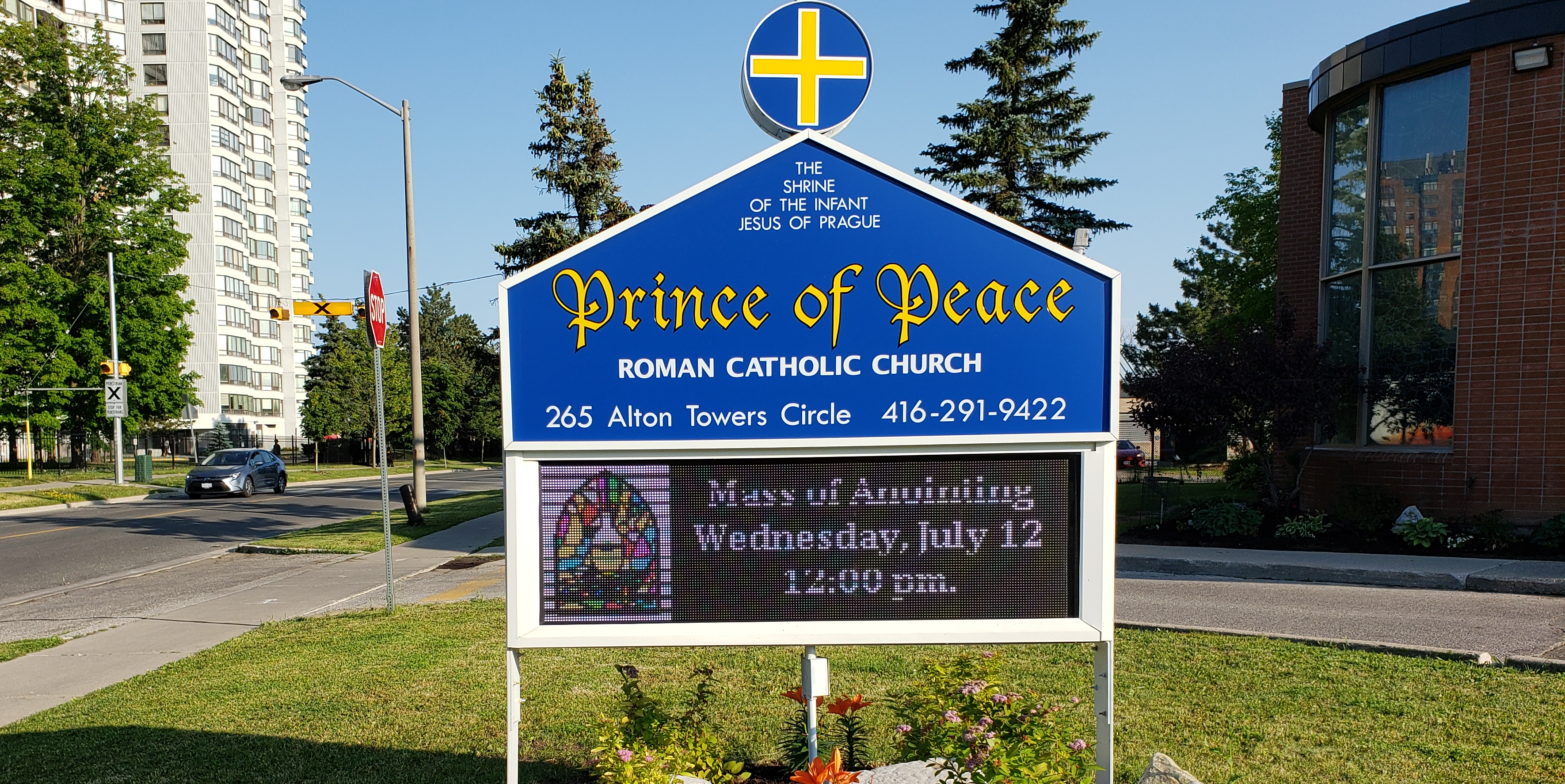
“Who then is this, that even the wind and the sea obey him?”
This reflection is based on the readings for the Twelfth Sunday in Ordinary Time—Year B: Job 38: 1-4,8-11; Psalm 107; 2 Corinthians 5: 14, 14-17; and Mark 4: 35-41.
One of the scariest things that ever happened to me, happened here at St. Peter’s Parish. For lack of a better description, I will call it: the pandemic.
On the first night, after the government announced the official lock down, I went to bed frightened about how the parish community would survive if we could not let people into the church. That same evening, at about three in the morning, I was awoken by a non-stop banging. It took me a few minutes to figure out where it was coming from. At first, I waited and assumed that it would stop. However, it did not stop and it sounded like there was someone pounding on the door with a hammer. I soon realized that it sounded like someone pounding on the door with hammer, because it was someone pounding on the door with a hammer. Since it seemed like it was never going to stop, I made what could be considered the somewhat unwise decision to go to the door to see what was going on. At the door, I was greeted by a man completely wrapped in plastic from head to toe, afraid of catching COVID and seeking a place to stay. After I explained to him that the fact that he was yielding a hammer made it difficult to feel safe providing him with shelter, I went back to bed and he seemed to understand. Shortly thereafter, I was awoken on two evenings by the alarm system and could hear someone in the rectory in the early hours of the morning. On both occasions, the police told me to stay in my room and wait until they had cleared the rectory. They sent three police cars and six officers on both occasions. Each time, although the man had left the rectory before they arrived, it was the same man who in the daytime had been throwing rocks at the church for no apparent reason. Throughout all of this, much like the disciples in the boat with Christ in the midst of the storm, I found myself asking, Lord, “do you not care that we are perishing?” 
Despite all the challenges that came with the pandemic, I have to say that in the end, it was one of the most amazing things that happened to my spiritual life. It called me to ask in ways that I never thought possible, “who is this Jesus whom I claim to believe in and do I really believe in him?” Just as Jesus asked his disciples why they were afraid and had no faith, difficulties and challenges can demand that we ask ourselves what we really believe about Jesus and whether we have real faith in Him. This is ultimately what today’s Gospel is asking us about our faith. Do we really believe and trust in the Lord and the promises that He has made us? For many people, their faith in Jesus is what I like to call “rabbit-foot faith.” They think that their faith in Jesus should work like a lucky charm. This means that they think if they go to Church and say their prayers, nothing bad will ever happen to them. This is kind of what the disciples are thinking as the storm threatens to overtake them and the boat that they are in. They cannot understand how bad things can be happening when Jesus is with them. They are also wondering how he can be so unconcerned during these trials. However, Jesus knows who He is and what His divine mission is, and so He is at peace and calls them to understand the peace that they should know if they really understood who He was and Is.
So who is He?
Over the past few weeks, I have been reading a book about the priesthood for a course that I will be teaching at the seminary. The book begins by stating that any Christian life and vocation, no matter what, must be grounded in an understanding of who Jesus was, is and will always be. The Gospel this Sunday kind of summarizes it by calling Jesus the one who commands even the seas and the winds. However, He is far more than one who just commands the sea and wind. He is also one of the Holy Trinity who created them and sustains everything in existence. However, because I think all of us need to be reminded from time to time who we actually profess Jesus to be, if we are to find the true peace that He invites us to, I would just like to share with you some of the qualities that this book on the priesthood focused on for an understanding of who Christ really is. Quoting the great scripture scholar Joachim Jeremias, Kenan Osbourne describes Jesus as the one who: 1) Has brought the return of the Spirit; 2) Overcome the rule of Satan; 3) Brought the dawn of the Kingdom of God; 4) Announces the Good News to the poor; and 5) Destroys death and wins for us eternal life. Because an understanding of these five aspects of Christ’s identity can bring us an understanding of who He is, that can bring us strength in all situations, I would like to touch on each of them briefly.
- Christ has brought the return of the Spirit: By His life, death and resurrection, Jesus has done something that no one else can do. He has reconciled us to the Father. The Communion between humanity and God that existed before the fall and original sin, has been restored in Christ. At Pentecost, the Holy Spirit came down upon the Church and Christ now abides with us through the power of the Holy Spirit. That means that God is with us no matter what happens to us. One of the titles for Jesus is “Emmanuel,” which means “God is with us.” As Jesus was with the disciples in the boat, He is always with us through the power of the Holy Spirit. When frightened, confused or alone, Christ is with us. We can turn to Him for guidance, consolation or knowledge that the crisis that we are enduring will not be the last word about us. No matter what, even should we die, Christ will raise us up and is with us. This is why we have the sign of peace after Christ appears in our midst on the altar at Mass in the Eucharist. He is with us and this should be the source of our peace. It is why Jesus tells His disciples that they should be at peace in the storm; because He is with them. Each one of us can ask Christ to be with us and send His Holy Spirit into our hearts when we are alone, frightened or confused.
- Christ has overcome the rule of Satan: This simply means that in the end, God will always be triumphant. There is so much uncertainty in our world today and many feel as though they are thrown about like the disciples in the boat with Jesus. However, Jesus’ promise is that Satan will never be victorious. Just as Jesus commands the wind and the sea, we also see in Mark’s Gospel, and the others, how all the demons submit to Christ and obey him. In fact, many scripture scholars say that Mark has Jesus speak to the sea in the same manner that he has Him command the demons and they all listen. For a time, the powers of evil may have their way, but Christ will ultimately overcome them. In particular, Mark is writing to a Christian community that is being persecuted and cannot understand why they are suffering if Christ is the Messiah. Mark wants the community to know that if they persevere through their trials, they will be victorious with Christ and evil will be defeated. For me, one of the beautiful examples of this is the photos of the Popes visiting Auschwitz and entering the gate where so many were brought to their death by evil forces. Those who held power and executed evil are dead and God and goodness live on. Christian peace is to be found in an ultimate faith that Christ has defeated Satan and that we can ultimately overcome all evil we can suffer through perseverance and faith in Christ and His resurrection.
- Christ has brought the dawn of the Kingdom of God: Throughout His mission, Jesus constantly announced that He had brought the Kingdom of God into our midst. His mission was to preach the Kingdom of God. The fact that He has brought the dawn of this Kingdom means that while it is not entirely here, its beginning is in our midst when we live in His presence by faith. Like when the sun is rising, and it is in the distance, we are living at the dawn of the Kingdom. When we are in Christ’s presence here, our communion with Him and the Holy Trinity, places us in the “already, but not yet.” Living in communion through the Holy Spirit, knowing that He has and will defeat Satan, we trust that our true citizenship is in Heaven and that there all things will be well. Even if we have trials and tribulations on our journey, through Christ and our faith in Him, we can be confident that there is a place for us in Heaven and that through Christ we can overcome all things. The waves and storms of life will come to an end in Christ and the life He has prepared for us in Heaven. Knowing this, and living in communion with Him here on earth, we experience the “already but not yet” of Heaven. This, through faith and perseverance, is to be the source of our peace and confidence in life.
- Christ has come to announce the Good News to the poor: The Good News that is contained in everything said above is that God loves all people and His plan of salvation is for everyone. Those who are suffering in this life are His beloved brothers and sisters. Because of His message and love for all, those who are not economically poor are called to recognize that all that they have, and are, is a gift from God. Because we are all brothers and sisters created by a loving God, we have a responsibility to care for others, especially those in need. The truth of our faith teaches us that in reality we are all poor and all that we have is a gift from God. These gifts ought therefore to be used to assist and care for those who go without. However, even if through sin, others go without and suffer want, God is with them and His word on the day of the resurrection will ultimately be the last and final word spoken on the value of all persons. Awaiting the Kingdom, Christians are called to recognize the value of all who are created in the image and likeness of God. Should we fail to do so, God will not be silent and is with all people now and will end all suffering in His Kingdom.
- Christ destroys death and has won for us eternal life: The disciples in the boat with Jesus are impressed because He commanded the sea and the wind. This is nothing compared to what we profess to believe. The next time you are feeling stressed out about life, why not just review the creed. We profess that God created the world out of nothing; that Jesus is God’s Son who came into the world to save us; that He rose from the dead and destroyed death; that He sent the Holy Spirit into our hearts and remains with us; that we will rise from the dead as well; and that a place has been prepared for us in Heaven. And just to throw in a few more amazing and very comforting things, we also believe that He continues to come to us through the Church in the sacraments—most especially in His Body and Blood in the Eucharist. One image of the Church that is often used is that it is a big boat intended to carry all of God’s people to heaven. The message of today’s Gospel is that Jesus is with us in this boat through the storms of life, and tribulations of our time, and asks us to really believe in who He is and what He has, can and will do for us.

In the end, what am I suggesting with all of this? It is quite simple: when we are frightened and confused, we can have a tendency to obsess on the challenge and problem before us. By doing this, we can and do lose our perspective. Sometimes what we need to do is focus on who Jesus is and what promises He has made to us. This can be done by praying the “Our Father” quietly; praying the mysteries of the rosary; or perhaps just reciting the creed and focusing on what we truly believe about Christ. One of my favorite things to do is to simply recite the quiet mantra: “Lord Jesus, Son of the Living God, I place my trust in you.” It is true, it does not tell me how the situation will be resolved or how I will come through it. It does, however, remind me, that Christ is with me and that through Him, no matter what happens, I have been saved.
The disciples in the boat found peace in the midst of the storm that surrounded them because Jesus commanded the sea and the wind. You and I are invited to find our peace in the one who has overcome death, won a place for us in Heaven, and has promised that He is with us until the end of time. May we find that peace not in our own efforts to solve our problems, but in our knowledge of who Jesus the Lord really is—the Son of God.
Fr. Michael McGourty is Pastor of St. Peter’s Church in downtown Toronto.
